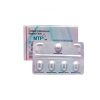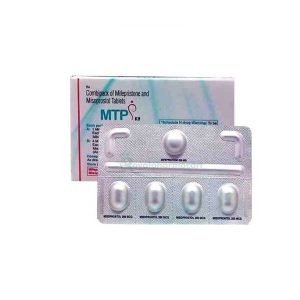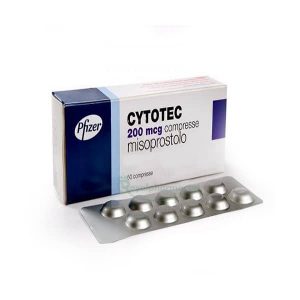RU-486 (Mifepristone)
$110.00 – $199.00
|
Table of Contents ToggleGeneric Brand |
Mifepristone |
Medication For |
Medical Abortion |
Manufacturer |
Saokim Pharma |
Dosage |
200mg |
Packaging |
1 Tablets in strip |
Delivery Time |
10 to 15 working days |
RU-486 (Mifepristone)
RU-486 (Mifepristone), also known as mifepristone, is an oral medication used in combination with misoprostol to terminate premature pregnancy in women. It is prescribed to women in early pregnancy or within 63 days of pregnancy.
RU-486 (Mifepristone) is an anti-pregestational steroid that works by blocking the effects of progesterone, thereby softening the cervix and causing uterine contractions. It is also used to control high blood sugar levels in people with Cushing’s syndrome.
Your doctor will prescribe the medicine for you during your visit to the clinic. Follow your doctor’s prescription carefully and get the desired result.
What is RU-486?
The abortion drug, also known as RU-486 (Mifepristone), has been widely and safely used in the United States for many years. Approved by the FDA as a drug-based abortion method.
The trade name of RU486 is Mifeprex, and the common name is Mifepristone. You should consult your healthcare professional to use the RU-486 (Mifepristone).
The use of abortion medications involves a two-step process of taking two different medications that work to end the pregnancy. It is important to note that abortion pills are not the same as the morning after the pill.
How does RU-486 works?
RU-486 (Mifepristone) belongs to a class of drugs called progesterone steroids. It works by blocking the effects of the female hormone progesterone and causing uterine contractions.
Progesterone is an essential female hormone that plays an important role in maintaining the menstrual cycle and pregnancy. It thickens the inner lining of the uterus and helps prepare the eggs for fertilization.
RU-486 or mifepristone terminates early pregnancy by blocking progesterone activity at the progesterone receptor.
People with Cushing’s syndrome lower their blood sugar by blocking the activity of cortisol. Cortisol is a stress hormone and is the main natural glucocorticoid in the human body.
It affects many physical functions such as controlling blood sugar, regulating metabolism, reducing inflammation, and promoting memory formation.
What is RU-486 (Mifepristone)?
Mifepristone (formerly known as RU-486) is
Blocks the action of the hormone progesterone. Progesterone
Necessary to maintain pregnancy. Mifepristone is used in
In combination with another medicine called prostaglandins,
Since 1988 in France and China,
In the UK and Sweden in the early 1990s it was
It is licensed for use in 37 countries, including the United States.
Approved in September 2000. Millions of women
Safely use the mifepristone regimen worldwide,
Pregnancy.
How RU-486 (Mifepristone) Works to Terminate Pregnancy?
Mifepristone blocks the action of the necessary progesterone
To maintain pregnancy. This makes it look like this:
- Endometrial changes and detachment of the endometrium pregnancy
- Softening and opening of the cervix
- Increased uterine sensitivity to prostaglandins
In the United States, mifepristone is used in combination with another mifepristone
A drug, a synthetic prostaglandin called misoprostol.
Misoprostol causes the uterus to contract,
Closing fabric to drain.
How effective is the combination of mifepristone and Misoprostol in early pregnancy?
Mifepristone, according to the protocol of the attending physician
Misoprostol can be used for premature miscarriage up to 63 days later
The beginning of the last menstrual period. About 95-98% of
If used, women will have a complete miscarriage
Mifepristone / Misoprostol. The success rate is
Treatment plan and gestation period. the
The rest of the women will need a suction procedure for one reason or another
Continuous or excessive bleeding, incomplete miscarriage (tissue)
It remains in the uterus, but no growing embryos), or
Pregnancy in progress (possible pregnancy in progress,
Less than 1% of cases).
What are uses of RU-486 (Mifepristone)?
RU-486 (Mifepristone) is prescribed for the treatment of the following symptoms:
Abortion – Used in combination with misoprostol to end a woman’s pregnancy early (within 9 weeks).
Cushing’s Syndrome – A condition that occurs when the body produces too much cortisol and blood sugar levels rise.
RU-486 Composition
Mifepristone (200mg)
How to use RU-486 (Mifepristone)?
If you choose to use an abortion pill, there are three steps to the process.
First, get RU486 (Mifepristone) taken orally at a clinic. At this time, you may be asked to take antibiotics.
Second, 24 to 48 hours after taking mifepristone, you usually need to take the second medicine by mouth at home. It’s called misoprostol. Make sure your doctor gives you instructions on how and when to take misoprostol.
Finally, after about 2 weeks, you will need to book a follow-up with your doctor. This is very important because your doctor will confirm that the abortion worked. Your doctor will likely do a pregnancy blood test or ultrasound to make sure you’re no longer pregnant.
If the abortion medication does not work, your doctor will discuss your options with you. Additional medications or procedures may be needed to complete the abortion.
Who can use it?
The FDA has approved RU486 for women up to 10 weeks gestation or from the first day of the last menstrual period to 70 days later.
Dosage Instructions
RU-486 (mifepristone) tablets are used in combination with misoprostol, causing premature miscarriage in women. One tablet is intended for oral administration by a doctor during a clinical visit. It is recommended to take 4 tablets of misoprostol within 24-48 hours to induce an abortion.
Mifepristone is supplied in 200 mg tablets. A starting dose of 300 mg per day is recommended for the treatment of Cushing’s syndrome. The dose can be increased within 2-4 weeks of treatment after proper examination by a physician. Follow your doctor’s prescription carefully and avoid drug overdose.
If you forget a dose: If you are taking this medicine for a miscarriage, you cannot skip a dose. On the other hand, if you are taking this medicine for the treatment of Cushing’s syndrome, take the missed dose as soon as possible. When it is time for your next dose, skip the missed dose. Do not overdose to make up for missed doses.
Overdose: Overdose of drugs can lead to serious side effects. If you suspect an overdose, contact your doctor immediately.
Important Tips
Tell your doctor before taking RU-486.
If you are allergic to misoprostol or other medications.
If you are taking oxytocin.
If you have irritable bowel syndrome (IBS).
If you have heart disease.
If you have intestinal diseases.
If you suffer from diseases such as diabetes, high blood pressure or angina pectoris.
If you ever have a history of stroke, heart attack.
RU-486 (Mifepristone) side effects
These include:
- Cramps
- nausea
- Vomiting and diarrhea
- Massive bleeding (there may be large blood clots in the blood)
- Stomach pain
- Malaise
- Mild fever or chills on the day of taking misoprostol
Seek medical attention if you experience severe pain or fainting. Also, if you have a fever after the day you took misoprostol, contact your healthcare provider.
Advantages
- Effective
- Less body invasion than surgical abortion
- Some consider it a more natural abortion option because it feels like a miscarriage.
- Private
- Can be used in early pregnancy
Disadvantages
Some people are morally opposed to this method because the design and implementation have already taken place.
Mifepristone may not be an option for liver and kidney problems, anemia, diabetes, Rh negative blood, or overweight women.
This method requires several visits to your health care provider and may not work.
If the abortion drug does not terminate the pregnancy, carrying the baby during delivery can lead to birth defects.
Interaction with other Drugs
Certain drugs are known to interact with and affect RU-486 (mifepristone). Tell your doctor if you are taking herbs, OTC, entertainment, or other forms of medication.
- Cyclosporine
- Fentanyl
- Anticoagulants such as warfarin
- Dexamethasone
- Antibiotics such as erythromycin
- Oral antifungal agents such as ketoconazole
- Calcium channel blockers such as amlodipine
- Carbamazepine
- Atorvastatin
- Pimozide
- Ergotamine
- HIV Protease Inhibitors such as Indinavir and Ritonavir
- Phenytoin
- Rifampicin
- John’s wort
Interaction with alcohol
Alcohol can increase the chances of having side effects. The consumption of alcohol must be absolutely avoided.
RU-486 (Mifepristone) storage instructions
RU-486 tablets must be stored correctly and safely in their original packaging.
Keep the pill away from direct sunlight, moisture and sunlight.
Keep the pill away from children.
After opening the package, store the remaining tablets in a closed container.
Do not take after the expiration date.
Alternatives Available
- CYTOTEC 200 MCG (MISOPROSTOL)
Zydus Cadila
- MTP KIT
Cipla Ltd.
When should I not take these medicines?
Abortion medications are a safe option for ending a pregnancy in the first 12 weeks, but they are generally not the right option for everyone. Therefore, do not use the RU-486 if you have any of the following:
Ectopic pregnancy-An ectopic pregnancy that implants outside the womb and can only be treated by a doctor.
Chronic adrenal or liver failure.
You are infected with HIV-If you are infected with HIV, you may be at increased risk of infection during the abortion process. Therefore, before using an abortion drug, you should use antibiotics at the same time and contact your doctor.
STI-If you have a sexually transmitted disease such as gonorrhea, you should see a doctor.
IUD is installed-Intrauterine device must be removed before taking abortion medication.
Porphyria: Hereditary disorders such as porphyria affect the ability of the blood to carry oxygen to organs and tissues.
FAQs.
What does RU486 or Mifepristone do to babies?
Mifepristone or RU486 works by blocking the effects of progesterone, causing fetal death (or baby death).
When does bleeding begin after taking mifepristone?
Most women bleed within the first 48 hours of taking mifepristone. The flow is similar to the flow of menstruation. Bleeding can be managed using a hygiene pad.
When does bleeding stop after taking mifepristone?
Bleeding usually stops within 12 hours of starting mifepristone. A few women experience a complete miscarriage after taking mifepristone alone.
Is it possible to have an abortion with mifepristone alone?
Mifepristone (or RU486) alone is known to abort pregnancy in more than 80% of cases.
A study of 150 women showed unusual results in 131 women having a complete miscarriage after taking 600 mg of mifepristone. With a success rate of 87.3%, mifepristone alone can end early pregnancy and is estimated to be a good alternative to surgical abortion.
What happens if I take mifepristone without getting pregnant?
Even if you are not pregnant, taking mifepristone does not affect your body or cause complications for future pregnancies. Mifepristone is used not only for abortion but also for the treatment of Cushing’s syndrome. Well, the bad news is that you may still experience the side effects associated with the drug.
Is Mifepristone Safe During Breastfeeding?
Yes! Mifepristone is completely safe while breastfeeding. Women can safely take mifepristone while breastfeeding their existing baby.
One study was conducted on 12 breastfeeding women who had an abortion. Of the 12 women, 2 received a single dose of mifepristone 200 mg. Mifepristone has always been rated undetectable in breast milk and is completely safe for babies.
Can I buy an abortion drug at a pharmacy?
No, you cannot buy over-the-counter abortion medications from pharmacies. Only available by prescription from your healthcare professional’s office, family planning center, or abortion clinic.
What is the difference between RU486 and Plan B?
Plan B is an emergency contraceptive that is taken orally to prevent unwanted pregnancies after unprotected sex or failure of contraception (such as broken condoms or misplaced IUDs). Plan B is not an abortion drug and will not work if you are already pregnant. RU486 is a medical abortion option that is taken orally and is used when a woman is already pregnant.
How effective are abortion medications?
Abortion drugs are very effective. The effect depends on the duration of pregnancy when taking the drug.
For people under 8 weeks gestation, it works 94-98 times out of 100 times.
For people 8-9 weeks pregnant, it works 94-96 times out of 100.
For people 9-10 weeks pregnant, it works about 91-93 times out of 100 times. If you take additional medicines, it will work about 99 times out of 100 times.
For people 10-11 weeks pregnant, it works about 87 times out of 100 times. Taking additional medicines will work about 98 out of 100 times.
Abortion medications usually work, but if they don’t, you can take more medications or have an abortion in the clinic to complete the abortion.
Disclaimer:
Royalpharmacart.com content is for informational and educational purposes only. We do not provide legal advice. Likewise, we do not provide medical advice, diagnosis or treatment. Speak to your doctor before consuming modafinil or related nootropics, have a query, write us at support@royalpharmacart.com
| Pills | 1 Pill, 2 Pill |
|---|
Only logged in customers who have purchased this product may leave a review.
Related products
ABORTION
ABORTION





Reviews
There are no reviews yet.